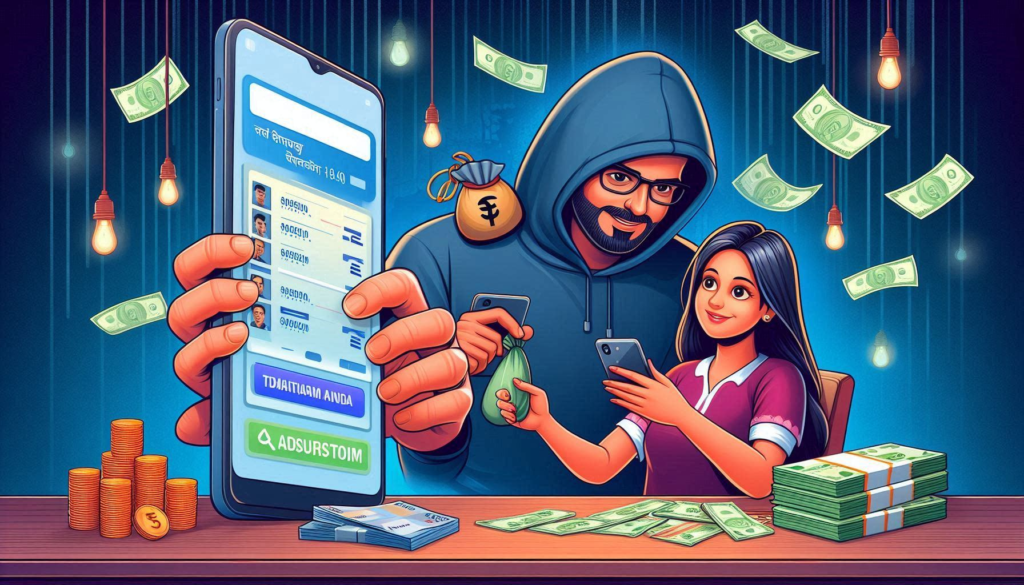Last week my friend Manjula, a software engineer received a call from some Peter who mentioned that he is her father’s friend and had borrowed 15,000 from him sometime back. He further mentioned that her father had told him to do UPI transfer to her as he was not able to digitally transfer to her father’s number. Manjula asked him to transfer to her number, she first gets a sms message of 10,000 money transfer and next she gets a sms message that 50,000 was transferred. Immediately she gets a call from Peter saying that he has transferred 50,000 instead of 5,000, can she please return the remaining 45,000. Manjula agrees and before transferring she checks her bank account only to find that no money has been deposited into her account, when she questions Peter on this, he says there may be delay in bank transaction but he needs the money back urgently and rushes her to transfer back when she says that she will transfer once she gets the money. Peter makes multiple calls citing some emergency and rushes her for money, Manjula gets suspicious and when she checks with me on this I tell her that this is new type of scam called Money Transfer cyber fraud and asks her to be firm that she will return back only when she receives the money. The calls stop after some time.
Money Transfer fraud is increasing a lot nowadays, and are deployed on unsuspecting victims under different pretexts like buying a product on sale in OLX or in any such social media marketing website. Here again all the communications happens over phone and sms messages, the fraudster will try to convince the victim that he has sent more money by mistake and rusher the victim to transfer back the extra money only later the victim realizes that he had not received any money at all.
There is another version of it where fraud money transfer Apps which resemble the GooglePay, BHIM and PhonePay and shows on screen the money is transferred to the owner of the QR Code and also sends sms message on the same but the money is not deposited or really transferred to the owner of the QR code. The victim will think that the money is transferred and gives the product to the fraudster without getting payed for. You can check out my blog for other QR code frauds.
How you can protect yourself from Money Transfer fraud :-
- Always follow the principle of ‘ Zero Trust, Pause and Authenticate’ for all digital transactions, basically respond after verification and not react instinctively.
- Check if you have really received the money in your bank account before acting on the transfer.
- Traders may benefit from installing QR payment soundbox like PayTM soundbox which confirms the receipt of money.
- If someone rushes or hurries you to transfer money or do something unnecessarily then it may be a fraud.
- Verify the sender’s number to name he has told by typing that number in googlepay send to phone number option or in truecaller app.
- Never click on any link or scan a QR code sent by stranger as you may loose money or get infected with a software virus.
If you are a victim of Money Transfer Fraud :-
Immediately call 1930 cyber helpline number or file a complaint at cybercrime.gov.in or at the nearby police station. If you have transferred funds, then call up the bank and request for a debit freeze for the amount transferred. If you have clicked on any link or scanned a QR code, your device may have been infected with a software virus, hence run a antivurus scan or format/data reset the device.
Legal Remedies available :-
One can register a criminal case in cyber police station under :
- section 419 (punishment for cheating by impersonation), 420 (cheating and dishonestly inducing delivery of property), 464 (make a false document or false electronic record) and 465(Punishment for forgery) of Indian Penal Code(IPC)
- section 43 (Penalty and compensation for damage to computer, computer system, etc.), section 66 (punishment for computer related offences – a person committing data theft, transmitting virus into a system, destroying data, hacking, or denying access to the computer or network to an authorized person is imprisoned for a maximum of 3 years or a fine of 5 lakh rupees or both), section 66C(which prescribes penalties for identity theft and states that anyone who fraudulently or dishonestly uses a person’s identity information will be subject to imprisonment up to 3 years and a fine of up to 3 lakh rupees) and Section 66D (punishment for fraud by impersonation using computer resources) under of the Information Technology Act(IT) Act 2000.

